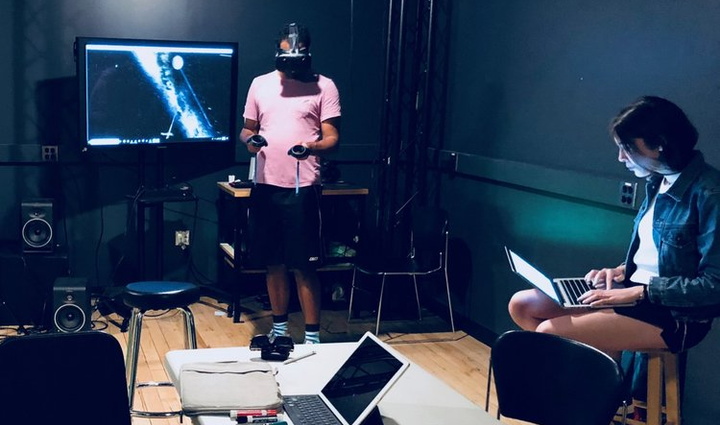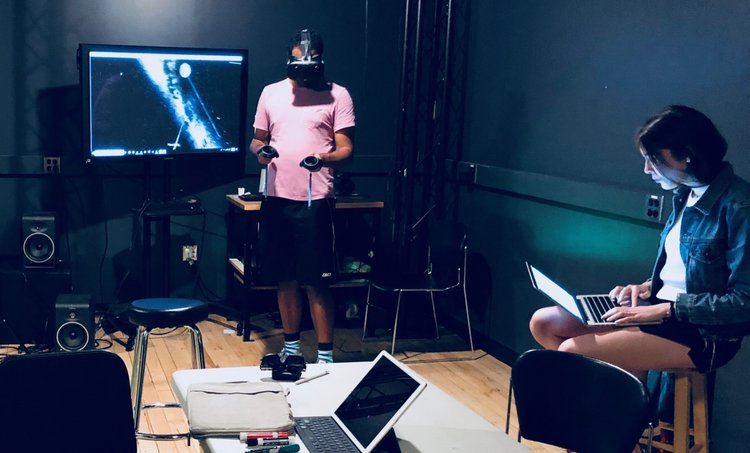Yale OpenLab Launches
The Yale OpenLab, which officially launches this week, has an ambitious vision: with a focus on scalable collaboration, it aims to incubate “bold projects that address our planet’s grand challenges.” As it begins to carry out this vision this fall, building collaborations across its home campus will be a priority.

The OpenLab team hopes to empower Yale students from all disciplines to explore new technologies, including blockchain, virtual reality, and the Internet of Things, and to develop novel, collaboration-minded applications for these tools. Though the OpenLab’s primary hub at Yale is Tsai CITY, it will act more as a decentralized innovation space, partnering with campus interdisciplinary centers like the Center for Collaborative Arts and Media (CCAM), Center for Engineering Innovation and Design (CEID), and Center for Business and the Environment (CBEY) as it gets a host of programs and projects off the ground. The lab’s leadership is also looking beyond Yale in its ambitions: all OpenLab projects will be open-source, allowing innovators anywhere to see what OpenLab teams are working on — through publicly accessible code and documentation — and to build on this work.
In his doctoral research at the University of Melbourne, Martin Wainstein, Tsai CITY’s Open Innovation Fellow and the founder of the OpenLab, focused on frameworks for collaborative innovation, particularly the combination of systems thinking and design thinking. It struck him that while concepts like Open Innovation have existed for decades in corporate R&D practice, the development of technologies like accessible mobile internet and blockchain, which facilitate rapid peer-to-peer information exchange, open the possibility of applying these frameworks on a much larger scale. With the launch of the OpenLab, he hopes to build on his research, testing methods for large-scale collaboration in real time. “We are proposing a model to incubate open and participatory projects,” he explains. “The lab is [itself] the main experiment that we are testing.” In the process, Wainstein and the OpenLab team aim “to find innovative ways where collaboration can scale and help solve our largest and most pressing Earth system problems, like climate change.”

This year, OpenLab will focus its efforts on this fundamentally global challenge, housing a cluster of programs and projects related to climate and clean energy. Through a CITY Intensive, for example, students will dive into virtual and augmented reality, using these tools to create immersive learning experiences about energy systems. Other students will participate in a collaborative hackathon focused on using real-time data to develop a global carbon ledger and systems for carbon accounting. One working group will explore how blockchain can facilitate the development of more affordable, democratic energy infrastructure, contributing to an ongoing OpenLab project that aims to convert all of Puerto Rico’s public schools to solar-powered emergency shelters.
This project is part of a campus-wide growth in energy around blockchain, a digital ledger system that allows for the decentralized verification of transactions between parties. Wainstein sees particular potential in blockchain as a tool for large-scale open innovation; in a Q&A earlier this year, he noted, “Blockchain allows, through ‘smart contracts,’ a lot of frictionless interactions between peers, developing things like Decentralized Autonomous Organizations, organizations that live online, that have an in-built democratic governance.” In its role as a space for open projects, the OpenLab is currently incubating the Yale Blockchain Initiative, which it hopes will be a student-led home for innovation with blockchain. This month, over 150 students will have a chance to discover this tool for themselves through a Blockchain Bootcamp, which will offer two tracks: one focused on introducing students to blockchain for the first time, and another geared toward students who have some familiarity with the technology but want to take their skills to the next level.
Ultimately, Wainstein and the OpenLab team are eager to connect students with technologies like blockchain, but it’s the possibility of developing less tangible tools for innovation that really excites him. “It is in the social innovations that come from people working together and harnessing collective intelligence where we think the most disruptive technologies are,” Wainstein notes. “Fundamentally, we want to prove that collaboration, rather than competition, should be the ethos to solve global problems.”
Learn more about the OpenLab here. Want to get involved? This week, head to an info session for the Intensive on blended reality for Earth and energy systems (9/18) or an info session for the working group on blockchain for open microgrids (9/20).